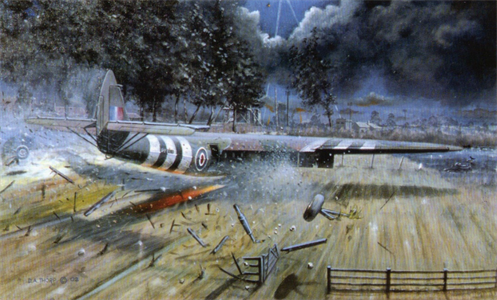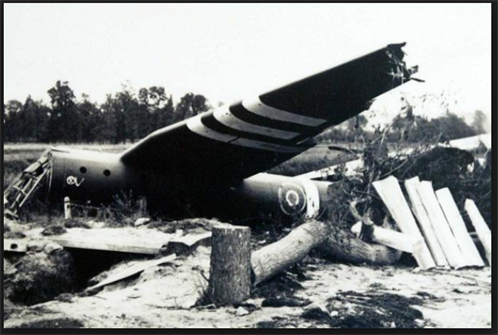Operation TONGA; D-Day 6th June 1944
First part known as the “Coup-de-main” Codenamed “DEADSTICK”
Comprising gliders each carrying 25 troops of the Oxford & Bucks Light Infantry and Royal Engineers; 3 gliders to attack the bridge over the Caen Canal, and 3 to attack the bridge over the River Orne, taking off at 1 minute intervals from Tanant Rushton airfield in Dorset.

On board the first glider for the Canal Bridge was Major John Howard i/c the operation. The fourth glider to take-off was the first aircraft for the River Bridge, on board was Capt. Brian Priday, 2nd i/c of the operation. Unfortunately the first glider for the Ome River Bridge was towed by the RAF to a bridge over the River Dives.... approximately 10 miles distant, near Cabourg. Despite having no previous knowledge of the area and landing in darkness at 0020 hrs the skill of the 2 pilots of the Glider Pilot Regiment, S/Sgts Lofly Lawrence and Tony Shorter, was obvious. The operation involved descending from the height of 6000 ft at the rate of 2500 ft/min, performing rate one turns at predetermined courses/intervals. Whilst pilots of the other gliders were decorated for what was considered, by the Air Ministry, to be outstanding achievements of navigation these 2 pilots received nothing as they had been towed to the wrong bridge.
Capt. Brian Priday’s account :-
“My glider was No.4 in the flight plan and we carried No.22 Platoon with Lt. Hooper in command, 5 sappers, my runner and myself} apart from the 2 pilots. The first 3 gliders took off at 2256 hrs and my 3 followed at 2300 hrs. We got into the air safely and although I spent all my time, until it was dark, looking out of the window I saw nothing of the others. I allowed smoking as we were in a state of intense excitement.
At 2350 hrs, thirty minutes before we were due to land, I stopped smoking and had the lights put out for fear of enemy fighters. We checked our equipment and weapons, and I wondered if our grenades would explode if we had a heavy landing. I said nothing of this. I stressed the importance of shouting as we came into land since I didn’t want deaf men to deal with when we reached the ground. I again went into the cockpit and kept a running commentary going of all I saw. I didn't see very much as it was a dark, cloudy night. We were flying at 6000 ft but l managed to discern the sea as we crossed the coast, and l could make out the French coast by the flak coming up to our right. We escaped it ourselves. At this stage, about 0005hrs. 6th June 1944 I ordered safety belts to be put on and gave a reminder about holding on to one another and lifting the legs clear of the floor for the landing. I gave an extra reminder to Lt. Hooper and to Private Johnson, who were sitting on my right and left about this, because I wanted the door open for a quick exit on landing, opening the door was a job that had to be done after cast-off and which in turn meant that I would not have time to strap my safety belt on, so that I was going to rely on these two to hold me firmly in my seat. They did their job well. We cast off and I opened the door, I looked out into the darkness and saw nothing. Then I made my way to my seat opposite the door and sat down to await the landing. Hooper and Johnson held me very tightly, but I shall always remember the odd feeling I had as we went into a steep left-hand turn, losing height rapidly, and finding myself looking straight out and down through the doorway into the darkness and clouds below. I shouted at least as loudly as the others, for I did not want to be temporarily deaf when l reached the ground, owing to the increase of atmospheric pressure as we lost height. We soon straightened out, still losing height, and rather more quickly than I expected we hit the ground. We hit it very hard, for it was extremely dark, and the pilots could hardly see, and bounced up into the air again. We seemed to poise for a minute with our nose in the air, and then we came crashing to the earth once more, tearing along the ground at a terrific speed. The wheels must have come off as the floor of the glider broke up and the seats came adrift. We came to a standstill, the troops on my side almost lying on their backs. With difficulty, we got out of the wreckage to have a look at a little wood I wanted to get to. I then went down to the river bank to try and make contact with the other party. No answer came to my shouts. They must have withdrawn from the bridge, but I had confidence in Sergeant Barwick who was with them. The next thing that happened was when the men from the wood came back to report that the wood was clear and that Lt. Hooper was there waiting for me. Before we could move we heard voices coming from out of the darkness and footsteps down the middle of the road. Very soon I recognized Lt. Hooper’s voice. He was talking very loudly and I soon knew why. He was being marched along with his hands in the air and a Boche escorting him. I was wondering what to do when Hooper edged over towards the spot where, only a few minutes before, he had left me. This gave me a view of the German against the skyline. I had my Sten ready and with a shout “jump Tony” (Lt Hooper’s Christian name) l fired a big burst at the Hun. He went down and didn't move again. Unfortunately, as he fell he pressed his trigger and Lance-Sergeant Raynor, who was lying next to me, was hit in the shoulder. Another round hit my map case. My chinagraph pencils were mined, but at least I had got Hooper back. Apparently, a few minutes alter dispatching the two men to report to me a party had moved into the wood and he had walked up to them, thinking it was I. They were, in fact, a party from the other bridge coming to see what all the fuss was about. The issue as obviously confused to them because of the lone escort being sent to the bridge from which all the firing had come. Guns from the enemy in the wood now opened up, and very obligingly, the gun from the bridge we had just crossed fired back at them. Hoping they would continue to fight each other, I thought it a good time to get out. Lining up at the side of the road, I gave the order ‘Go’ and we dashed across the road. Unfortunately, Private Everett, my w ireless operator, was killed at my side and we had to leave him behind. We now moved off the road into the floods, dykes, ditches and rivers of the Dives Valley. For about two hours we swam and waded, going south. In places we had to get the non-swimmers across on toggle ropes. Eventually we made it back to our Regiment at the River Ome Bridge at 0730hrs. 7th June, having lost four men.
The first glider landed at the Caen Canal Bridge at 0016.hrs.(later to become known as Pegasus Bridge).
Amongst those on board was Major John Howard, 1'/c the operation. The command pilot being Staff Sergeant Jim Wallwork; Jim claims that, when freely translated “Coup-de-Main“ means “I really wish I wasn’t here “. A picture of his glider appears below;
